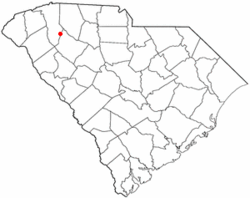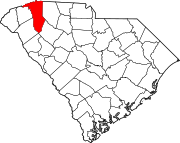Fountain Inn, South Carolina
Fountain Inn | |
|---|---|
 Top, left to right: Downtown Fountain Inn, Fountain Inn City Hall, Cannon Building, Fairview Presbyterian Church, Robert Quillen Office and Library | |
 Location of Fountain Inn, South Carolina | |
| Coordinates: 34°41′36″N 82°11′55″W / 34.69333°N 82.19861°W | |
| Country | United States |
| State | South Carolina |
| Counties | Greenville, Laurens |
| Area | |
• Total | 8.50 sq mi (22.01 km2) |
| • Land | 8.45 sq mi (21.89 km2) |
| • Water | 0.05 sq mi (0.13 km2) |
| Elevation | 866 ft (264 m) |
| Population | |
• Total | 10,416 |
| • Density | 1,232.52/sq mi (475.90/km2) |
| Time zone | UTC−5 (Eastern (EST)) |
| • Summer (DST) | UTC−4 (EDT) |
| ZIP code | 29644 |
| Area code(s) | 864, 821 |
| FIPS code | 45-27070[4] |
| GNIS feature ID | 1222514[2] |
| Website | www |
Fountain Inn is a city in Greenville and Laurens counties in the U.S. state of South Carolina. The population was 10,416 at the 2020 census,[5] up from 7,799 in 2010. It is part of the Greenville-Mauldin-Easley Metropolitan Statistical Area.
History
[edit]The Cannon Building, Fairview Presbyterian Church, Fountain Inn High School, Fountain Inn Principal's House and Teacherage, McDowell House, Robert Quillen Office and Library, Tullyton, and F. W. Welborn House are listed on the National Register of Historic Places.[6][7][8]
Geography
[edit]The southern part of the city is in Laurens County, while the bulk of the city is in Greenville County. The city's nickname is "The Diamond Tip of the Golden Strip".[9] The city took its name from an inn and fountain that were along the old stagecoach route.[10] The stagecoach drivers called the stop "Fountain Inn", and it stuck. A small garden fountain is installed at City Hall, and there is a marker on the north side of town showing the former location of the old inn.
South Carolina Highway 14 runs through the center of town as Main Street, and Interstate 385 runs along the southern edge of the city, with access from Exits 22, 23, and 26. Greenville is 17 miles (27 km) to the northwest, and Columbia is 84 miles (135 km) to the southeast. Via Highway 14, Laurens is 16 miles (26 km) to the southeast.
According to the U.S. Census Bureau, the city of Fountain Inn has a total area of 7.9 square miles (20.5 km2), of which 0.04 square miles (0.1 km2), or 0.43%, are water.[5]
There are several festivals in Fountain Inn, including Aunt Het Day, based on syndicated cartoon columnist Robert Quillen, that brings in several hundred visitors as Main Street is closed and filled with many unique vendors.
Demographics
[edit]| Census | Pop. | Note | %± |
|---|---|---|---|
| 1890 | 212 | — | |
| 1900 | 497 | 134.4% | |
| 1910 | 979 | 97.0% | |
| 1920 | 1,100 | 12.4% | |
| 1930 | 1,264 | 14.9% | |
| 1940 | 1,346 | 6.5% | |
| 1950 | 1,325 | −1.6% | |
| 1960 | 2,385 | 80.0% | |
| 1970 | 3,391 | 42.2% | |
| 1980 | 4,226 | 24.6% | |
| 1990 | 4,388 | 3.8% | |
| 2000 | 6,017 | 37.1% | |
| 2010 | 7,799 | 29.6% | |
| 2020 | 10,416 | 33.6% | |
| 2023 (est.) | 13,027 | [11] | 25.1% |
| U.S. Decennial Census[12][3] | |||
2020 census
[edit]| Race | Num. | Perc. |
|---|---|---|
| White (non-Hispanic) | 5,883 | 61.4% |
| Black or African American (non-Hispanic) | 2,981 | 27.92% |
| Native American | 12 | 1.6% |
| Asian | 68 | 0.2% |
| Pacific Islander | 19 | 0.0% |
| Other/Mixed | 434 | 7.47% |
| Hispanic or Latino | 1,019 | 8.7% |
As of the 2020 United States census, there were 10,416 people, 3,170 households, and 2,532 families residing in the city.
As of 2023, of the 10,416 people, about 7,777 are in Greenville County and about 2,639 are in Laurens County.[14]
2020 census
[edit]As of the census[4] of 2020, there were 10,416 people. The population density was 988.9 inhabitants per square mile (381.8/km2). There were 2,465 housing units at an average density of 447.2 units per square mile (172.7 units/km2). The racial makeup of the city was 61.49% White, 27.9% African American, 1.6% Native American, 0.2% Asian, 0.00% Pacific Islander, and 7.4% from two or more races. Hispanic or Latino of any race were 8.7 % of the population.
There were 3,538 households.
The population in the city consists of 25.7% under 18 and 9.7% who were 65 years of age or older. The median age was 33 years.
The median income for a family was $65,221. The per capita income for the city was $25,855. About 13.2% of the population were below the poverty line.
Government
[edit]Fountain Inn is governed by a mayor, a city council, a city administrator, and several boards and commissions. The current officeholders are:
City council
- Mayor: GP McLeer
- Council Ward I: Jason Sanders
- Council Ward II: Jay Thomasson
- Council Ward III: Joey Garrett
- Council Ward IV: Phil Clemmer
- Council Ward V: John Don
- Council Ward VI: Mack Blackstone
Crime
[edit]The city of Fountain Inn has one of the lowest crime rates in Greenville County and has the best record in closing case files of towns of similar sizes and geographic area.[citation needed] The Fountain Inn Police Department has annual reports and information regarding current records and statistical surveys of the area.
Education
[edit]Residents in both counties are in the Greenville County School District.[15][16]
88.9% of the residents have a high school diploma or equivalent, 28.1% with bachelor's degree, and 4.1% hold a master's, professional or doctorate.[citation needed]
Notable people
[edit]Fountain Inn was the adopted home of journalist and humorist Robert Quillen, one of the "leading purveyors of village nostalgia" during the early decades of the 20th century.[17]
Fountain Inn was the home town of one-legged tap dancer Clayton "Peg Leg" Bates.
Fountain Inn is the home town of Travelle Wharton, a retired NFL offensive lineman. He played for the Carolina Panthers of the NFL from 2004 through 2011. He joined the Cincinnati Bengals for the 2012 season. He played college football at the University of South Carolina.
See also
[edit]References
[edit]- ^ "ArcGIS REST Services Directory". United States Census Bureau. Retrieved October 15, 2022.
- ^ a b U.S. Geological Survey Geographic Names Information System: Fountain Inn, South Carolina
- ^ a b "Census Population API". United States Census Bureau. Retrieved October 15, 2022.
- ^ a b "U.S. Census website". United States Census Bureau. Retrieved January 31, 2008.
- ^ a b "Geographic Identifiers: 2010 Demographic Profile Data (G001): Fountain Inn city, South Carolina". American Factfinder. U.S. Census Bureau. Retrieved February 8, 2017.[dead link]
- ^ "National Register Information System". National Register of Historic Places. National Park Service. July 9, 2010.
- ^ "National Register of Historic Places Listings". Weekly List of Actions Taken on Properties: 1/30/12 through 2/03/12. National Park Service. February 10, 2012. Archived from the original on May 31, 2014. Retrieved May 31, 2014.
- ^ "National Register of Historic Places Listings". Weekly List of Actions Taken on Properties: 6/27/11 through 7/01/11. National Park Service. July 8, 2011.
- ^ "Welcome to Fountain Inn". Fountain Inn Chamber of Commerce. Retrieved February 8, 2017.
- ^ "Communities". Laurens County Chamber of Commerce. Archived from the original on January 13, 2013. Retrieved June 14, 2014.
- ^ "City and Town Population Totals: 2020-2023". United States Census Bureau. May 16, 2024. Retrieved May 16, 2024.
- ^ "Census of Population and Housing". Census.gov. Retrieved June 4, 2015.
- ^ "Explore Census Data". data.census.gov. Retrieved December 14, 2021.
- ^ "General Highway System Greenville County, South Carolina" (PDF). South Carolina Department of Transportation. August 2023. Retrieved October 25, 2024.
- ^ "2020 Census – School District Reference Map: Greenville County, SC" (PDF). U.S. Census Bureau. Archived (PDF) from the original on October 9, 2022. Retrieved October 25, 2024. - Text list
- ^ "2020 CENSUS - SCHOOL DISTRICT REFERENCE MAP: Laurens County, SC" (PDF). U.S. Census Bureau. Retrieved October 26, 2024. - Text list
- ^ John Hammond Moore, ed., The Voice of Small-Town America: The Selected Writings of Robert Quillen, 1920-1948 (Columbia: University of South Carolina Press, 2008), xi.




